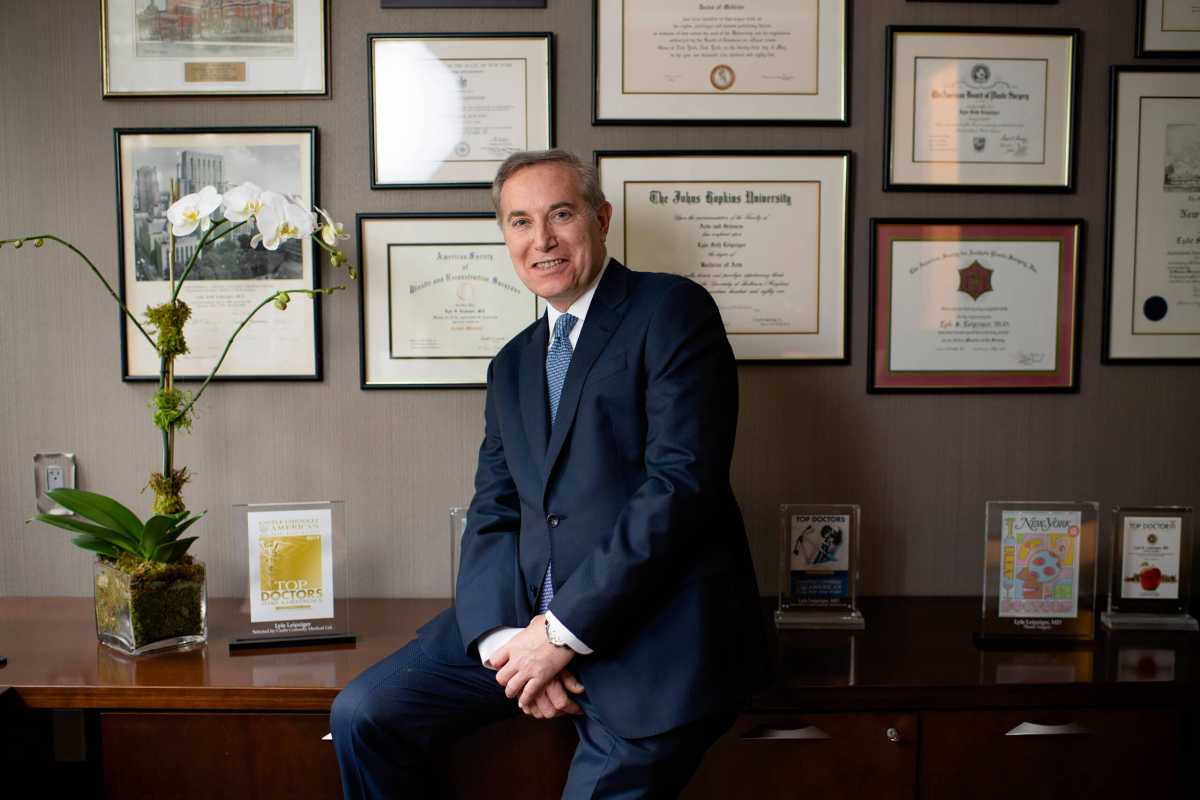Most people know that cosmetic surgery, especially when performed by a skilled doctor, can do a body tremendous good.
But not everyone thinks about the strong impact on the mind and on overall well-being.
“People want to look as good as they feel,” says Dr. Lyle Leipziger, adding that sometimes they look in the mirror and feel their appearance simply doesn’t match their inner self.
And that can have a detrimental effect on a person’s confidence, happiness, and mental well-being.
With more than 25 years’ experience, Dr. Leipziger, an award-winning, New York-based cosmetic, plastic, and reconstructive surgery specialist, is trying to change that, one patient at a time.
“I’ve always wanted to be a doctor, for as long as I can remember,” recalls Leipziger, who received his medical degree from Cornell University Medical College.
He explains that while still in high school, he volunteered in a hospital emergency room on Long Island and says it was an “incredible” and formative experience.
Asked how he decided on plastic surgery as his specialty, Leipziger says it was based on his own experiences. “I saw people coming in [to the hospital] with injuries that would necessitate the special care that a plastic surgeon could provide.”
Specifically, he recalls that a man in his early 30’s came into the ER with “significant facial lacerations.” Leipziger says he asked the plastic surgeon who was on call if he could observe.
He says he watched the plastic surgeon “painstakingly and with extraordinary care” attend to the man’s injuries, sewing multiple layers of facial tissue together slowly and carefully with each suture, and at the same time trying to keep the man calm during the procedure.
“I was both astounded and fascinated at the same time,” he says, adding that it was the plastic surgeon’s attention to detail that really appealed to his own, highly detail-oriented nature.
Leipziger, the chief of plastic surgery at both North Shore University Hospital and Long Island Jewish Medical Center, adds that plastic surgery seemed to him to be both “an art and a science” at the same time. “This is what attracted me to the field.”
During his time in medical school in New York, he says, “I did rotations and electives in plastic surgery. I saw patients before, during and after procedures, and I watched them experience significant positive change. From then on, I was hooked.”
Even after being exposed to other medical specialties, Leipziger kept coming back to plastic surgery to realize his “lifelong dream.”
He adds, “plastic surgery can change people’s lives and make them feel better about themselves…That’s what’s so amazing about it.”
Splitting his time between practices in both Great Neck and Manhattan, Leipziger’s work focuses on cosmetic surgical and non-surgical procedures for both women and men.
Specialties of his practice include face lifts, eyelid lifts, breast augmentation/lift/reduction/reconstruction, tummy tucks, liposuction, and a variety of non-surgical procedures, from Botox and fillers to laser skin rejuvenation.
“Plastic and cosmetic procedures can be very rewarding for many people, changing their outlook on life and giving them a huge psychological boost,” he says. “In the world we live in, a very visual one, this can be as important as a healthy diet, exercising and other ways people strive to look and feel their best.”
For example, Leipziger says he recently treated a woman in her early 60s, who, after being widowed, wanted to get back into dating and having a social life. But, he says, she felt that she looked older than her age and wanted to have a more youthful appearance.
Dr. Leipziger performed a facelift and neck lift for her that was “completely transformative,” giving her the boost in self-confidence that she needed.
“When she returned to my office several months later, she appeared confident, smiling and much more at-ease with herself. She simply looked great.”
And Leipziger’s reputation is not merely based on the numerous awards he’s received, including Castle Connolly’s Best Doctors, both nationally and regionally, New York Super Doctors and New York Magazine’s Best Doctors. This is in addition to the many patients who refer their friends and family to him.
Even in the hypercritical world of online reviews, he is a step above.
On the doctor rating site Healthgrades, Leipziger has an amazing 78 total reviews that are all 5-stars, calling him everything from “the best,” to “tops in his field,” and an “incredible artist.”
While he estimates that most of his practice is comprised of women, roughly 80 percent, men also seek out cosmetic procedures. The most popular include facial rejuvenation for men who want to look and feel younger, as well as liposuction and the treatment of conditions like gynecomastia (enlarged male breasts).
Leipziger also adds that many non-surgical treatments, such as Botox and fillers can be extremely effective. “It’s not a one-size-fits all approach. There’s a certain sense of artistry involved when deciding which treatments will benefit patients the most.”
Regarding injectable treatments, Leipziger says there’s a certain degree of “wild, wild West” out there, referring to recent news reports of people getting dangerous treatments from unqualified providers. “People should always check a practitioner’s credentials before having any procedure done.”
He says there are also individuals seeking procedures that would not be appropriate for them.
“When I think someone won’t benefit from a procedure, I’ll tell them politely that it’s unnecessary or not right for them,” he says, adding that he’s also turned people down who may have had “unrealistic expectations.”
“Cosmetic and plastic surgery procedures are a journey we take together…with the goal of achieving the best aesthetic result,” he says.
Leipziger says that what sets his own practice apart from others is his “attention to detail, artistry and delivery of outstanding, personalized care, in a kind, compassionate way.”
His patients couldn’t agree more.





































